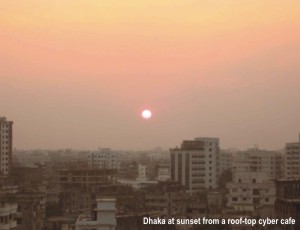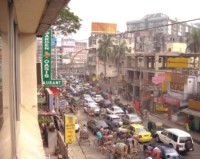|
Reflections
The
Journey Home
Nabeel
Atique
This
was my second trip to Dhaka in a decade. The last time I
was there was three years ago. Every time I go home, I have
a little bit of a shock. Things seemed to have changed in
leaps and bounds. By the time I'm ready to leave, I get
used to it all. That's the way it should be though, after
all Bangladesh is my home.
Upon
my arrival at Zia International Airport, I was greeted by
huge lines. I was especially grateful to have made it this
far, only to be stopped in my tracks by the immigration
line. As a matter of fact, I had been hanging out by the
beach in Thailand, on my way to Dhaka. I was five feet from
the ocean on December 26, 2004 and had the unique experience
of being chased by a Tsunami. I was literally chased all
the way home to Dhaka, only to come to an abrupt halt at
immigration. Once I finally made it through immigration
and customs (phew!), I was happy to be united with my family
and friends. It was the best reunion I ever had.
My first
impression of Dhaka was that it looked somewhat cleaner
than I remembered it. This pleasant thought was quickly
interrupted by the onslaught of cars driving on the wrong
side of the road. I realised some things hadn't changed.
The traffic grid-lock seemed to be at it's worst. On a particularly
good day it took me one hour to get to Dhanmondi from Eskaton.
I estimated the distance to be about 4 km. I could walk
that distance in about half the time. But how would I walk
in the middle of the day? I'd be lost in the same grid of
traffic, dodging cars, carts and rickshaws, without the
armour of my vehicle to protect me. And getting to Gulshan
from Motijheel? I might as well write my day off.
 The
cleaner air, I later found out, was because of the vast
number of vehicles now using natural gas. That also explained
why all the colourful scooters had vanished and in their
place there were green look-a-likes with the letters CNG
on them. I have to laud the country for taking such steps.
I was further impressed that a good deal of people now ran
their cars on natural gas because it was cheaper. Taka 35
a litre seemed a bit high for petrol and I'm sure natural
gas is a more attractive alternative. However, high petrol
prices obviously weren't stopping the influx of petrol-guzzling
luxury cars. I spotted a couple of Hummers and BMW 7-series
vehicles. I was, however, impressed to see that the world's
safest car Volvo had made it's way to Bangladesh. Thankfully,
Volvo's high-tech safety features would not be put to test,
because where in Dhaka can one drive above 20 km per hour? The
cleaner air, I later found out, was because of the vast
number of vehicles now using natural gas. That also explained
why all the colourful scooters had vanished and in their
place there were green look-a-likes with the letters CNG
on them. I have to laud the country for taking such steps.
I was further impressed that a good deal of people now ran
their cars on natural gas because it was cheaper. Taka 35
a litre seemed a bit high for petrol and I'm sure natural
gas is a more attractive alternative. However, high petrol
prices obviously weren't stopping the influx of petrol-guzzling
luxury cars. I spotted a couple of Hummers and BMW 7-series
vehicles. I was, however, impressed to see that the world's
safest car Volvo had made it's way to Bangladesh. Thankfully,
Volvo's high-tech safety features would not be put to test,
because where in Dhaka can one drive above 20 km per hour?
The
number of apartment buildings under construction and the
number of people selling their plots to construction companies
blew my mind! Since my days as a lecturer at North South
University back in 1995 things have certainly changed. Back
then, NSU and IUB were among the few prominent private universities.
Today Dhaka city boasts an impressive number of private
universities. And what's the buzz word these days? "MBA"
of course. Everyone wants to do an MBA. It's great to see
people aspiring to do things other than engineering and
medicine. Entrepreneurship seems on the rise too.
Everyone
has a mobile phone. And mobile phones come with their own
culture and lingo. One day I heard my mom say missed
call marse amake! (Someone gave me a missed call).
I then learned of the art of having someone else pay for
a conversation that you essentially initiated. It was hilarious!
Even our Imams have become high-tech savvy. In the days
of yore, the imam would ask to straighten the rows before
salat. Now he makes an additional announcement
to switch off mobile phones.

Learn
about our heritage at theLiberation War Museum |

Traffic
grid-lock in Baily Road. |

Colorful
sari shops in Bashundhara City. |
Bashundhara
City shopping complex was another eye-catcher. I was impressed
by the stylish glass capsule elevators and the food court
on the 8th floor. You could find burger, pizza, biryani,
tikkas, phuchkas, anything your palate desired. The stained
glass ceiling and the views of Dhaka city from the cyber
café balcony also scored points. And ofcourse, you
can shop till you drop there--leather goods, clothings,
DVDs, saris, and anything else your heart desires all under
one roof. But I noticed that on certain days it was hard
to get a salesperson to help.
The
Tigers were the talk of the town. They made Zimbabwe bow
and that was no small feat. It really made me proud to see
Bangladeshi cricketers make history.
My six
year-old and eleven-year old nieces were also visiting and
I wanted to take them somewhere special. The Liberation
War Museum would be the perfect treat. What amazed me was
how accessible the museum is costing a mere Taka 3 to enter.
And what amazed me even more was how few people I asked
had set foot in it. My nieces devoured the tour guide's
elaborate description of our fight for sovereignty.
The
best part about being home is always being with family.
The day I arrived I had a wedding reception to attend. Everyone
in Dhaka complains about the number of weddings they have
to go to. Not me. For me weddings in Dhaka are always fun
and I miss them when I'm in the States. They are also a
chance to meet with family and friends, all in one place.
And what could be better than a celebration of life, after
a near-death experience such as a Tsunami? In fact, having
survived, I realise now that life is unpredictable and one
should really focus on what's important. What's important
to me is to remember where my home is. It's where I belong:
Bangladesh.
Nabeel
Atique is an Ajunct Mathematics Instructor at San Jose and
Evergreen Colleges in the San Francisco Bay Area as well
as an avid mountaneer.
Copyright
(R) thedailystar.net 2004
| 